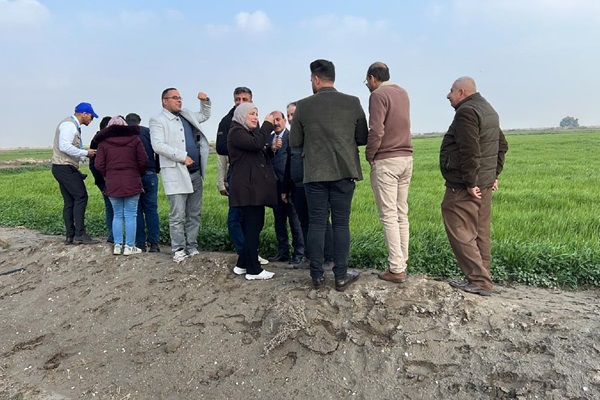 Iraq
Iraq
Latest news related to Iraq

WaPOR at the 3rd Baghdad International Water Conference on May 6
08/05/2023
Jippe Hoogeveen, a staff of the Land and Water division at the Food and Agriculture Organization (FAO) and Chief Technical Officer for the WaPOR project, recently attended the third Baghdad International Water Conference held between May 6 and 7, 2023.
During the event, Mr. Hoogeveen pa...

Consultative meeting between the national steering committee and the WaPOR international team (FAO, IWMI, IHE-Delft)
17/02/2023

WaPOR training in Iraq on data collection for crop mapping
23/01/2023

Training on field data collection using the Open Data Kit (ODK) in Iraq
31/10/2022
Resources and links
About Iraq
Iraq's water resources heavily depend on the rivers Euphrates and Tigris, which serve as surface water resources, as well as several fertile groundwater aquifers. Nonetheless, Iraq has shift from a water-secure to a water-stressed country over the last 30 years due to a combination of reasons, including:
- Neighboring countries’ development projects upstream from the Tigris-Euphrates, affecting quality and quantity of the water flow.
- Centralized and complicated governance of water, together with inadequate regulatory framework and enforcement.
- Reduced water use efficiency, with 75 per cent used in irrigation.
- Seventy-five per cent of irrigated land in central and southern Iraq is affected by salinization.
- Water contamination due to mainly untreated municipal and industrial wastewater discharge.
- Iraq is one of the most vulnerable countries of the Middle East to climate change.
To address this challenge, the Food and Agriculture Organization of the United Nations (FAO), in collaboration with the Ministry of Foreign Affairs of Netherlands, and MOWR has included Iraq in the second phase of the WaPOR project “Monitoring land and water productivity by Remote Sensing 2021-2025”.
The project aligns with the second government priority of the FAO-Iraq Country Program Framework (CPF) 2018-2022: “Restoration of degraded agricultural land and higher productivity of water resources in agriculture” and the 4th strategic priority of “Promoting Natural Resource and Disaster Risk Management, and Climate Change Resilience" under the Iraq United Nations Sustainable Development Cooperation Framework 2020-2024.
Project milestones:
December 2021: WaPOR phase 2 inception workshop in Baghdad
June 2022: WaPOR introductory training
November 2022: field data collection and validation training
January 2023: data collection for crop mapping training
Pilot areas:
- West Gharraf irrigation project area (Wasit /Thi Qar) for crop mapping, area measurement and production estimation; assessment of Water Consumption (WC) & Water productivity (WP); identification of best agricultural and irrigation practices to increase the water productivity of the main crops; all in support of the development of improved water allocation strategies;
- The second site is Shamamuk Irrigation project area in the Erbil basin for the identification of irrigated areas including unplanned groundwater extraction; assessment of the impact of irrigation withdrawals on groundwater resources and link its results to a local groundwater monitoring database.
WaPOR partnerships in Iraq
WaPOR phase 2 is implemented in conjunction with the Ministry of Water Resources, which co-chairs the project's Steering Committee alongside the FAO. All other partners (Ministry of Agriculture, Ministry of Planning, Ministry of Higher Education and Scientific Research, Ministry of Environment, Ministry of Agriculture and Water Resources in Kurdistan region and Ministry of Planning in Kurdistan region) are also represented in the committee.

© FAO/Cengiz Yar
